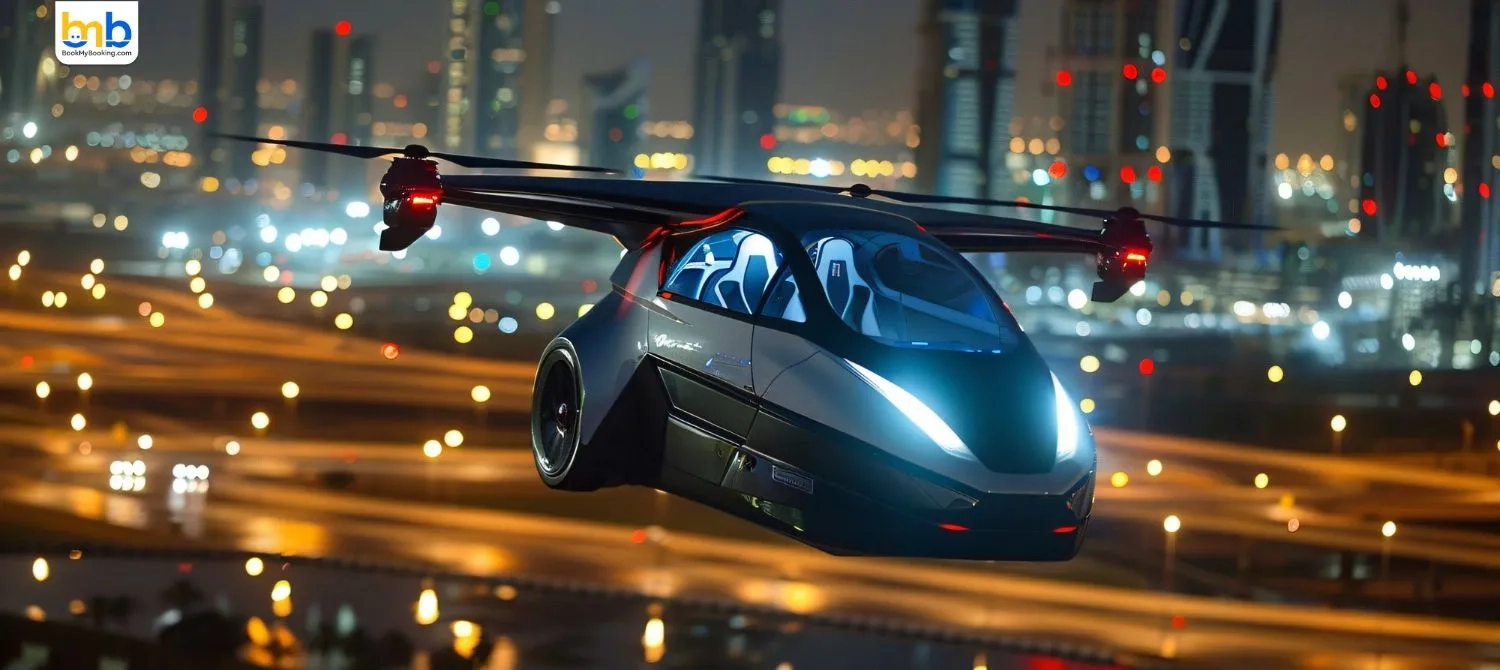Saudi Arabia in the UAE is poised to revolutionise urban transportation with autonomous aerial vehicles. The Front End and Cluster 2 Airport has partnered with EHang to deploy passenger air taxis and cargo drones. This initiative perfectly aligns with Saudi Vision 2030. This aims to establish local manufacturing and expertise, potentially making the Kingdom a pioneer in urban air mobility.
Saudi Arabia is preparing to take its futuristic mobility plans to the skies. In a landmark move, two Saudi firms, Front End and Cluster 2 Airports, have signed a memorandum of understanding with Chinese eVTOL maker EHang to roll out autonomous aerial vehicles across the Kingdom.
The deal announced on September 23 2025, is being hailed as a stunning one that will turn the concept of flyir cards and autonomous air taxis from science fiction into a visible reality in Saudi skies.
Saudi Arabia MoU: What the flying taxi deal covers
The MoU is more than a symbolic signing. It outlines a clear roadmap for transitioning autonomous serial vehicles from trial flights to commercial deployment in Saudi Arabia.
Key points of the agreement include:
- Passenger air taxis and cargo drones for mobility and logistics.
- Urban Traffic Management to regulate low-altitude air traffic
- Localisation of operations to build Saudi expertise and supply chains
- Certification and regulation through the General Authority of Civil Aviation
- This framework is designed to move Saudi Arabia from pilot demonstrations into full-scale flying operations.
Flying cars in Saudi Arabia: How eVTOLs Will Transform urban Travel
The term flying cars often sparks images of futuristic movies. In reality, Saudi Arabia's plan centres on electric vertical takeoff and landing (eVTOL) aircraft, which are essentially compact, drone-like vehicles capable of transporting passengers over short distances.
Unlike traditional helicopters, these aircraft are fully electric, reducing carbon emissions. Can, calm, and efficiently cruise to the urban environment that is able to fly without a pilot.
Companies behind Saudi Arabia's flying car dreams
Front End, a Saudi technology and industrial solution company located in Dharan, is in line with Vision 2030, boasting a growing portfolio of high-tech companies. It will drive localisation investment and integration into Saudi Arabia's broader tech ecosystem.
Cluster 2 Airports- The state-linked operator managing 22 airports across Saudi Arabia, giving the project immediate access to infrastructure and operational corridors for aerial vehicles.
EHang: A Chinese autonomous aerial vehicle manufacturer best known for
its EH216 eVTOL platforms, which have been tested in multiple countries. It brings the aircraft technical expertise and operational playbook.
Together, the trio will act as pioneers in introducing air taxis, cargo-flying vehicles, and integrated aerial traffic systems in the region.
Saudi Arabia's air taxi trials and aviation regulations
Saudi Arabia does not begin with scratches. In June 2024, a successful unmanned aerial vehicle (UAV) test was conducted in Mecca, which proves the feasibility of technology in urban surroundings. In August 2024, Gaca unveiled its roadmap for Advanced Air Mobility, stating that unheard-of and vertical takeoff and landing cars will be certified, monitored, and integrated into the national airspace. The Memorandum of Understanding is now aligned with the roadmap, indicating an impact on real-world operations when implemented.
Ehong, for its share, has already received commercial approval for its AAVs in other countries. Those have been well deployed for use in Saudi conditions. Saudi Arabia does not begin with scratches. In June 2024, the Kingdom conducted a successful unmanned aerial test in Mecca, proving the feasibility of the technology in urban surroundings.
Cost of flying taxis and local manufacturing plans
The companies have not yet disclosed an exact per-ride fare. Industry standards suggest that the cost of an on-demand air taxi trip could range from USD 200 to USD 400 per passenger, depending on distance and demand, with prices expected to decrease as adoption grows.
The vehicles themselves, such as the EHang EH216, are estimated to cost between $300,000 and $450,000 each, depending on the configuration and certification requirements. The MoU outlines local manufacturing and assembly plans in Saudi Arabia, with Front End leading the localisation push.
This includes-
Building assembly lines in partnership with EHand to reduce import reliance.
Developing supply chains for battery control systems and components.
Training Saudi engineers and pilots to oversee operations and maintenance.
This aligns with the Kingdom's wonder push to create domestic high-tech industries under Vision 2030.
In the coming years, Saudi Arabia's skyline may no longer be defined solely by skyscrapers, but by silent, autonomous flying cars ferrying people across its cities. If the plan unfolds as envisioned, the Kingdom could become one of the first in the world to normalise urban air mobility at scale.
#bookmybooking #saudinews #flyingcars #airtaxi #tourismnews


